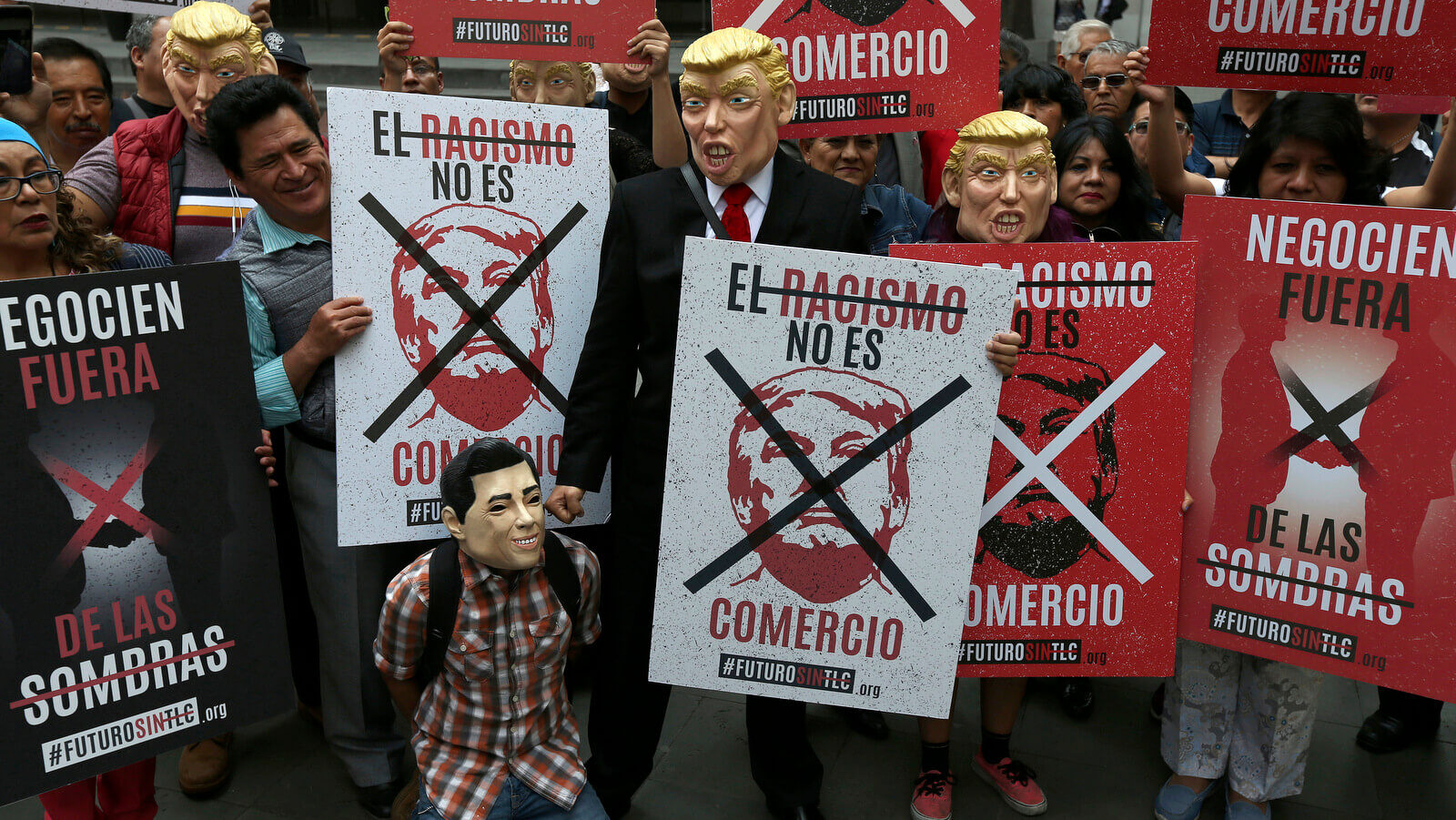Environmentalists on Monday slammed President Donald Trump’s replacement for the North American Free Trade Agreement (NAFTA), with Food & Water Watch executive director Wenonah Hauter warning that it «would enshrine and globalize Trump’s deregulatory zealotry into a trade pact that would outlast the administration and imperil future efforts to protect consumers, workers, and the environment.»
Presented as the United States-Mexico-Canada Agreement (USMCA), many have noted that Trump’s trade deal, as Bloomberg put it, «looks more like a rebranding than a revolution,» despite Trump’s vows when he was a presidential candidate that he would negotiate a new deal that’s dramatically better for American workers. As experts and campaigners comb through the details of the agreement, environmental activists are homing in on provisions they warn would endanger people and the planet.
Calling on Congress to reject the deal, Hauter outlined in a statement how USMCA:
- features deregulatory provisions that «would have a dangerously chilling effect on food safety enforcement»;
- includes «giant giveaways to the agrochemical industry,» from rolling back Mexico’s GMO rules to enabling companies such as Monsanto and Dow to keep pesticide safety data secret for a decade; and
- bolsters Trump’s industry-friendly agenda with measures that would «encourage more pipelines and exports of natural gas and oil that would further expand fracking in the United States and Mexico.»
«Based on our initial read, Trump’s trade deal poses a considerably greater threat to commonsense regulatory protections,» Hauter concluded. «A closer look at the text will undoubtedly reveal a host of pro-polluter, pro-fossil fuel industry, pro-Wall Street deregulation that has been a hallmark of Trump’s domestic agenda.»
While the agreement, unsurprising, does not mention «climate change» or anthropogenic global warming—including in its chapter on environment—as The Huffington Post pointed out, the deal limits the long-criticized investor-state dispute settlement (ISDS) process that corporate powers have used to override local environmental protection regulations.
However, there is a major exception that infuriated activists on Monday. As HuffPost outlined:
Under the rules, firms that have, or may at some point obtain, government contracts to drill or build infrastructure like pipelines and refineries in Mexico―such as ExxonMobil Corp.―can challenge new environmental safeguards Mexican President-elect Andrés Manuel López Obrador has vowed to erect.
«It’s like saying, ‘From here on, we’re going to protect the henhouse by keeping all animals away, except for foxes, they’re cool,'» Ben Beachy, director of the Sierra Club’s living economy program, said in a phone interview.
That’s not the only giveaway for the oil and gas industry. The updated deal, which requires congressional approval, preserves a provision that requires the U.S. government to automatically approve all gas exports to Mexico, despite another rule mandating regulators consider the public interest.
While American Petroleum Institute chief executive Mike Sommers on Monday celebrated the provision and encouraged lawmakers to sign off on USMCA, environmentalists such as Doug Norlen, director of economic policy at Friends of the Earth, called USMCA «a corporate giveaway intended to sharply limit the powers of government to protect people and the planet,» and «an attack on our ability to hold Big Oil and Gas accountable for the damage they cause to our communities.»
Labor advocates such as AFL-CIO trade policy specialist Celeste Drake, meanwhile, called on representatives from all three nations «to go back to the table and finish a deal that creates good, high-wage jobs, protects our environment, and safeguards our democracy.» Although Drake said Monday that «there are too many details that still need to be worked out before working people make a final judgment on a deal,» she highlighted a few alarming elements.
Broadly, Drake noted, USMCA «moves backward from the original NAFTA in many areas important to working families, including with respect to ‘good regulatory practices’ (code for using this trade agreement to attack important consumer, health, safety and environmental protections), financial services (providing new tools for Wall Street to attack efforts to rein in its continuing abuses), affordable medicines (extending monopolies for brand-name pharmaceuticals at the expense of affordability), and privacy of personal data.»
Top Photo | Mexican activists carry signs that read in Spanish «Racism is not commerce,» at a protest against the seventh round of the North American Free Trade Agreement, NAFTA, renegotiations, in front of the foreign relations office in Mexico City, Feb. 27, 2018. Marco Ugarte | AP
![]() Common Dreams is licensed under a Creative Commons Attribution-NonCommercial-ShareAlike 3.0 International License.
Common Dreams is licensed under a Creative Commons Attribution-NonCommercial-ShareAlike 3.0 International License.


